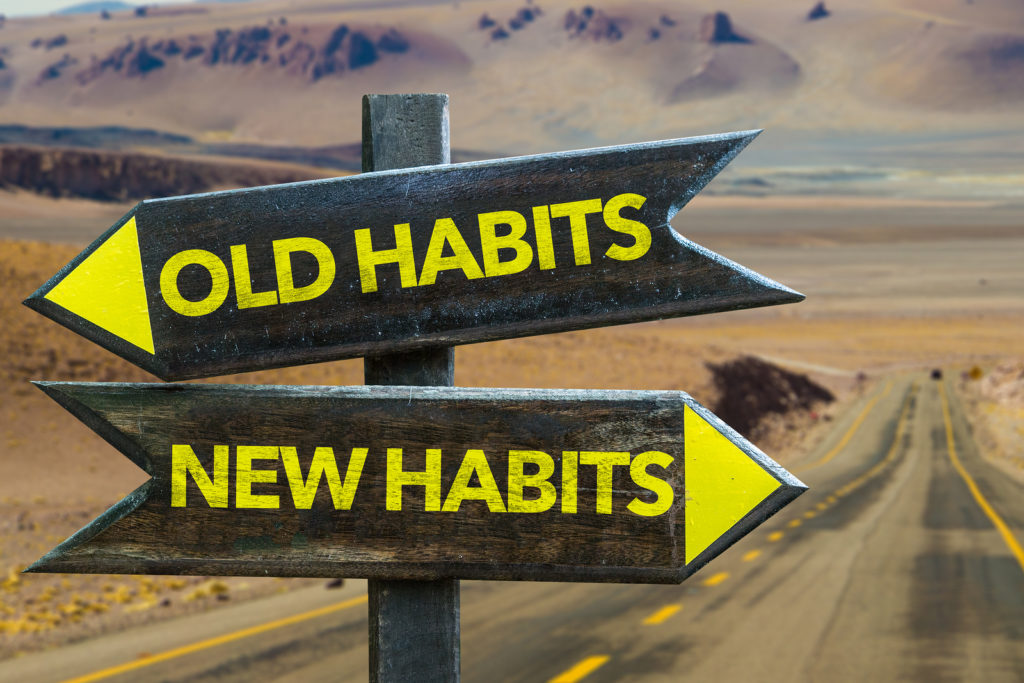
Bad habit? Who me? Truth be told, I have more than a few. Every person has some habit, belief or attitude they’d like to change. Just look at the new year’s resolutions that show up year after year, and all the articles written about them. Breaking a habit is more than declaring your intention to do so. If it were that simple, we’d all be the people we want to be.
A key component of changing a habit is replacing it with another, more productive one. Out with the old, in with the new.
Let’s first look at some of the aspects of motivation and change. Researcher James Prochaska studied why people could understand that something was bad (or unproductive) for them, and yet be unable to change it. He developed a model called the “Six Stages of Change.” Although Prochaska’s motivation for this work was understanding alcoholism and the challenges of long-term recovery, these steps are transferable to any undesirable habit. Below is my version, modified for general use.
Stage 1: Pre-Contemplation
Problem? Who me? I don’t have a problem.
Problem? Who me? I don’t have a problem.
Stage 2: Contemplation
Maybe there is something I should think about changing… but it’s not bad enough to do something about it.
Maybe there is something I should think about changing… but it’s not bad enough to do something about it.
Stage 3: Preparation
Yes, I’m ready to do something about it. What do I need to know? Who can I ask for help? What problems might I encounter along the way? When will I put this into action?
Yes, I’m ready to do something about it. What do I need to know? Who can I ask for help? What problems might I encounter along the way? When will I put this into action?
Stage 4: Action
The day is here, and it’s time to put all that preparation into action. One day at a time usually works best. It might be difficult, but I can do this. I’ve prepared and know what to expect.
The day is here, and it’s time to put all that preparation into action. One day at a time usually works best. It might be difficult, but I can do this. I’ve prepared and know what to expect.
Stage 5: Maintenance
I don’t want to go back to the way it was before… but there are temptations and distractions. What supports are available to me when it feels tough to maintain this new habit? What are the benefits for me to stay on track?
I don’t want to go back to the way it was before… but there are temptations and distractions. What supports are available to me when it feels tough to maintain this new habit? What are the benefits for me to stay on track?
Stage 6: Recycling or Termination
Recycling – (For one reason or another) I just can’t do this anymore. It’s back to square one. (But not really. Now I know what this process is like and odds are good I can do it again. This is a temporary setback.)
Termination – I beat this! My new habit is permanent, and I’ve created a real and meaningful change in my life.
Recycling – (For one reason or another) I just can’t do this anymore. It’s back to square one. (But not really. Now I know what this process is like and odds are good I can do it again. This is a temporary setback.)
Termination – I beat this! My new habit is permanent, and I’ve created a real and meaningful change in my life.
Breaking a habit often means
steps backward and forward.
As you absorb these steps, understand that they are fluid; you may go forward and backward multiple times until you finally change the habit, or decide to stop working on it.
According to this model, replacing an old habit with a new one falls into Stage 3, Preparation.
Let’s say you want to break a habit such as smoking or eating too many carbs. ’Just say no’ is not going to work for most of us. The laws of physics apply here, too. Since ‘nature abhors a vacuum’, part of breaking a habit must include a replacement habit, belief, or perspective.
What habits do you put in place when the urge to smoke crops up (about 100 times a day, in the beginning)? Chew gum, exercise, meditate, call a friend or mentor?
What do you do when you’re craving bread, cookies, chips and all those comfort carbs?
Replace a portion with a vegetable, chew gum, mindfulness meditation practice, walk the dog, join OA?
Replace a portion with a vegetable, chew gum, mindfulness meditation practice, walk the dog, join OA?
Intentions are wonderful. They provide direction and awareness; however, intention must always be followed up with action. Focusing on what you want (instead of what you don’t want) and implementing it is critical to breaking a habit.
* As always, remember that this learning also applies to your children. Be patient as you teach them how to think about options and solutions.
